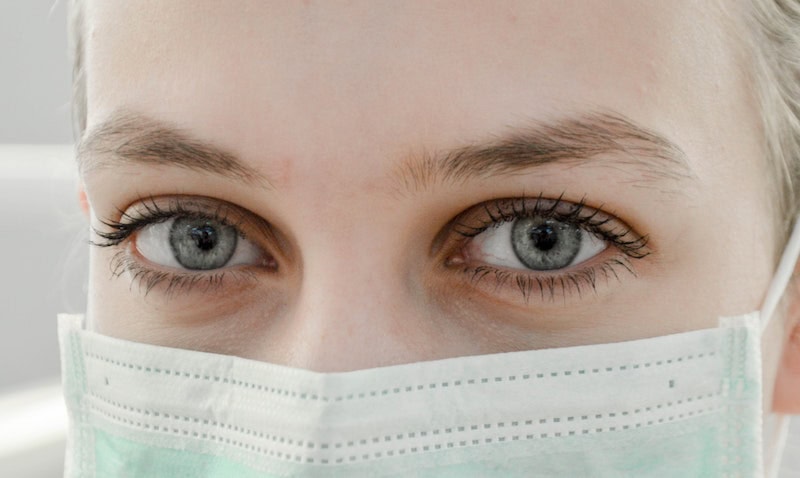As hospital employees and care providers on the front lines battle the coronavirus pandemic, the rest of us search for ways to help provide the supplies and support they need.
“We’re in uncharted waters,” Dr. Kate Tulenko, the CEO of Corvus Health, says. “The U.S might be able to do heart transplants and other great things, but our doctors can’t get masks right now. Hospitals are completely unprepared for this pandemic and are begging for help.”
While the average person cannot provide the things hospitals in the thick of COVID-19 most desperately need, such as intensive care unit beds and ventilators, physicians on the front lines insist that there are still steps we can take to be of service.
Here are nine ways you can help hospital workers right now.
The best thing you can do is stay home
“I cannot underscore how important it is for people to stay home during this period of social distancing,” says Dr. Tamara Moise, lead physician at Big Apple Urgent Care and an ER doctor at a hospital in Brooklyn that has been hit hard by COVID-19 cases. “The best way to help medical staff is to avoid getting sick. You’ve heard it over and over again, but it bears repeating, you may not exhibit symptoms but you may still be capable of passing the virus on to someone who will get very sick. Please do not go outside if you absolutely do not have to.”
If you feel sick, use a self-triage tool or call your provider rather than rushing to the hospital
If you think you may have COVID-19, don’t just rush to the hospital — self-quarantine and use a self-triage tool like C19check.com.
“We designed C19check.com at Emory so that people can have an easy-to-use, evidence-based tool to better assess their symptoms and determine what actions they should take,” says Dr. Justin Schrager, an ER doctor at Emory University Hospital and an assistant professor of emergency medicine at Emory University’s School of Medicine. “In order to alleviate the pressure that hospitals are currently under, we ask that people self-assess their risk before heading to the emergency room.”
Moise adds that if you do experience mild symptoms, “calling your primary care doctor, an urgent care or making a telemedicine appointment with an urgent care facility are the best ways to go.”
Make a monetary donation to a nonprofit hospital
In a time of historic financial uncertainty and mass layoffs, many of us are in budget mode with no cash to spare — but if you do have some extra money, consider donating to a nonprofit hospital.
“Some hospitals have specific COVID-19 funds, but even if you don’t donate to these, your donation to a nonprofit hospital goes to the running of the institution,” Moise says. “Your dollars can help a hospital pay for meals for medical staff, or even pay for protective gear. So please, donate where you can.”
Dr. Shruti Gohil, associate medical director, epidemiology and infection prevention, and an assistant professor in the division of infectious diseases at University of California Irvine Health, seconds the call for donations. “Hospitals will know how best to allocate funds according to the local needs, which are subject to change with time as the pandemic progresses,” she says.
Donate masks, hand sanitizer and cleaning supplies
“We are hearing a lot about the shortage of personal protective equipment (PPE) in hospitals,” Moise says. “This is the gear that medical staff uses to protect themselves from getting sick and also to prevent infection from one patient to another.”
Moise suggests that if you want to donate directly, look to your local government websites for guidance, as need and coordination varies from state to state and city to city.
Gohil recommends getting a “wish list” directly from hospitals, but says in general, this is what hospitals need most right now:
- Surgical masks
- N95 respirators
- Face/eye shields
- Gloves
- Cleaning supplies
- Hand sanitizers
- Viral testing swabs
In addition to the items Gohil noted, University of Chicago Medicine highlights the demand for disinfectant wipes, surgical and isolation gowns, cloth masks and other basics. Here’s the center’s list.
Call hospitals and/or physicians to ask what they need and look into local donation drives. “Here in New Jersey, the county sheriff’s office or the county executive has been running drives for [PPE] and other gear to address shortages,” Michael Avaltroni, dean of the Fairleigh Dickinson University School of Pharmacy & Health Sciences, says. “If you stockpiled on N95 masks or hand sanitizer, so long as it’s unopened and in good condition, you can donate it to someone on the front lines.”
Note that if you’re in an area that has not been badly affected by COVID-19, a donation drive will still see that your unused supplies get into the hands that need it. “It could be an EMT helping someone in respiratory distress — their risk to exposure is as high as anyone else’s and they need proper equipment.”
#GetUsPPE, a new initiative run by medical workers, engineers and volunteers that is helping to organize demands for gear in hospitals is a great resource for assessing donation needs and finding drop-off points. Check out their map here and follow them on Twitter here.
Sew masks
A handmade or sewn mask does not meet PPE standards, and even N95 masks are “not one-size-fits-all and should be properly fitted on an individual basis,” Avaltroni said. “But we’re in a war zone mindset right now where anything is better than nothing.”
So, by all means, keep sewing those masks and donating them in the organized way you would other supplies.
Got free time and in-demand skills? Ask your hospital how you can volunteer
“If you have any specific skills that could be useful, let your hospital know,” Gohil says. “Examples: You’re an engineer and can generate a prototype of a face shield for 3-D printing. You are a great communicator on the phone – maybe you can offer your services to help the hospital answer patient questions. You speak another language and can help translate a sign or communications that your hospital needs to reach out to a specific community.”
Run essential errands for higher-risk people
Though COVID-19 is potentially lethal to anybody, it is far more likely to cause serious problems and fatality in older people, as well as folks who are immunocompromised. If you know someone nearby who is considered high-risk, lend them a helping hand. Do their grocery shopping or whatever else you can do to ensure they stay home. It’s a good deed that will not only make you feel useful in a time when you might be feeling helpless, but also a small step to “minimize the risk that others get sick, and that helps everyone including our hospitals,” Gohil says.
Sending food to hospitals is great — just be organized about it
Providing hospitals and urgent care centers with tasty takeout helps keep workers fed and also gives much needed support to restaurants that have been devastated by social distancing measures. But please, don’t send food without coordinating it with the hospital first.
“It’s complicated because sometimes you can bring more chaos into a high-traffic and high-intensity environment by doing these well-intentioned things like ordering food delivery,” Avaltroni says.
Check out Feeding The Frontline, a grassroots initiative connecting people with restaurants to help not only medical workers, but also vulnerable populations and families who typically depend on schools for meals. You can also make a donation to Frontline Foods, which has launched a Covid Clinician Meal Support Program. As of April 1, they’ve raised $700,000 and delivered over 7,300 meals throughout 13 cities.
Schedule blood donations and give hospitals one less thing to worry about
Along with surges of COVID-19 cases and shortages of PPE, hospitals are also dealing with relatively normal needs — such as maintaining a stable supply of blood for trauma victims, cancer patients and anyone else who requires a transfusion.
“We really need people to schedule to give blood [this month],” Anthony Tornetta, spokesperson for the American Red Cross, says noting that there’s concern over a dip in blood supply as soon as mid-April. “Donating blood doesn’t require giving any money, and blood drives, which are considered essential business, are taking extra steps to stagger appointments, enhance social distancing and make sure everyone who comes in and out stays safe and healthy. Please schedule an appointment in advance at RedCrossBlood.org and give hospitals one less thing to worry about.”


